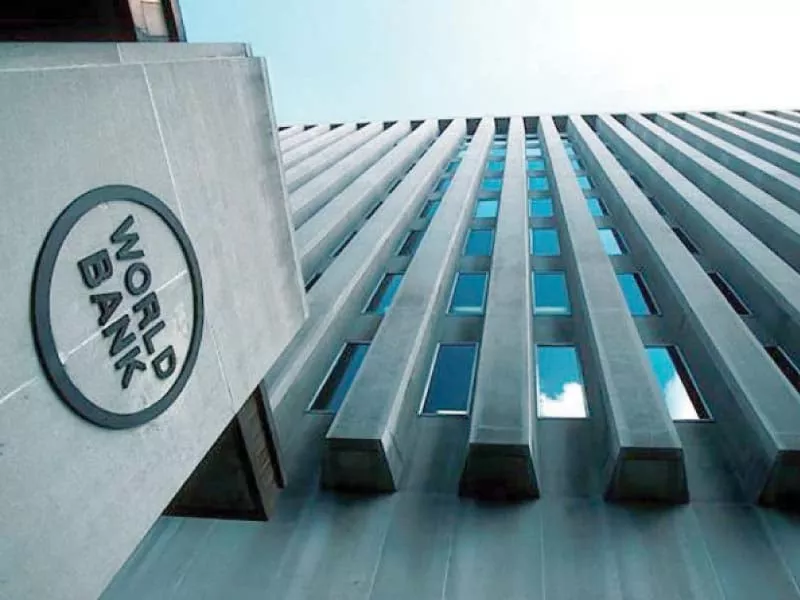World Bank approves $500m loan
Further revises downward GDP growth forecast for new fiscal year
ISLAMABAD:The World Bank has approved $500 million in budgetary support for Pakistan as it sees a steeper economic contraction in the range of 0.2% to 4% in the new fiscal year that begins today (Wednesday).
The World Bank’s board of executive directors approved $500 million in financing for the Resilient Institutions for Sustainable Economy (RISE) programme to help Pakistan strengthen fiscal management, promote transparency and private sector growth, according to a statement issued by the local office of the Washington-based lender.
The loan has been linked with undertaking foundational reforms in the energy sector to switch to low-carbon energy. These reforms are critical to building fiscal resilience and stimulating recovery from the Covid-19 pandemic, according to the World Bank.
With the fresh approval, total loans that Pakistan received or were approved for it amounted to $3.53 billion in June 2020 after the country’s gross official foreign currency reserves slipped to single digit. The cumulative gross borrowing by the Pakistan Tehreek-e-Insaf (PTI) government in fiscal year 2019-20 will now touch $11 billion.
The central bank on Tuesday also received $1.3 billion in commercial loans from China Development Bank ($1 billion) and Bank of China ($300 million). Pakistan had paid back these loans a few weeks ago but due to a condition imposed by the International Monetary Fund (IMF) China rolled over the loans.
Under the IMF programme condition, Pakistan cannot return Chinese loans until the programme ends.
The World Bank, Asian Development Bank (ADB) and Chinese loans are expected to stabilise Pakistan’s foreign currency reserves, built on foreign loans, and can arrest the downward slide of the rupee against the US dollar. The rupee closed at Rs168.05 to a dollar on Tuesday - the last day of fiscal year 2019-20.
The rupee value of Rs168.05 was close to the IMF’s revised assumption of Rs172 to a dollar.
A World Bank document that became the base for approval of the $500-million policy loan showed that the Washington-based lender did not see economic recovery in new fiscal year 2020-21, starting Wednesday.
With the biggest impact of Covid-19, “The economy is expected to contract in the range of 2.6% to 3.3% in FY20 and between 0.2% and 4% in FY21,” said the World Bank.
The National Accounts Committee has approved provisional 0.4% negative GDP growth for the just-ended fiscal year but the World Bank has again predicted that the contraction in the year will be in the range of 2.6% to 3.3%.
Not only that, for the new fiscal year, it has revised downward its forecast for Pakistan. Earlier, the World Bank had predicted negative 1% economic growth, which it now sees in the range of negative 0.2% to 4% in fiscal year 2020-21.
The government has set the economic growth target of 2% while the IMF sees the economy will expand by 1% in the new fiscal year.
The World Bank has also planned to approve another budgetary support loan for the Programme for Affordable and Clean Energy (PACE) to “tackle critical power sector reforms to ensure the sector becomes financially viable”.
However, during the Pakistan Muslim League-Nawaz’s (PML-N) tenure, the World Bank had also provided $1 billion in policy loan for power sector reforms. The World Bank’s independent assessment declared that the loan of $1 billion could not achieve its objectives. Yet, the World Bank is again ready to provide policy loan for power sector reforms. The government on Tuesday transferred Power Secretary Irfan Ali and appointed Omar Rasul as the new power secretary.
In his address to the National Assembly, Prime Minister Imran Khan also dubbed power sector reforms as his topmost priority. But so far power has been the worst performing sector under the PTI government as the circular debt almost doubled to over Rs2.1 trillion in just 22 months.
The World Bank said the pandemic also worsens Pakistan’s fiscal position as the collapse in economic activity dampens revenue mobilisation efforts but pressures on expenditures increase as the government tries to support the economy in these trying times.
“Pakistan is suffering a significant fiscal shock from the economic fallout from the pandemic and the increased spending on crisis response, including emergency healthcare, social protection and business support,” said World Bank Country Director for Pakistan Illango Patchamuthu.
The RISE programme supports government efforts to achieve macroeconomic stability, accelerates long-delayed policy reforms and sets the course for a strong and competitive economy, he stated.
The RISE loan programme supports reforms to broaden the tax base and reduce distortions in tax policy, strengthen debt management and transparency, and implement urgently needed reforms to achieve financial viability of the power sector, said the World Bank.
The World Bank said the RISE programme is aligned with the government’s Covid-19 crisis response, which aims to scale up spending on health and social protection while pursuing macro-fiscal reforms in the face of economic contraction.
Published in The Express Tribune, July 1st, 2020.
Like Business on Facebook, follow @TribuneBiz on Twitter to stay informed and join in the conversation.


COMMENTS
Comments are moderated and generally will be posted if they are on-topic and not abusive.
For more information, please see our Comments FAQ